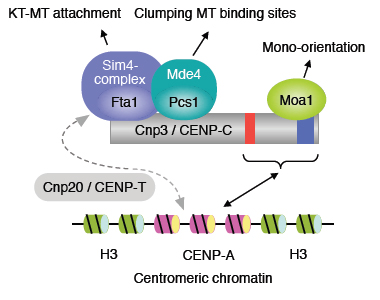CENP-C functions as a scaffold for essential kinetochore components in mitosis and meiosis
Kinetochore differentiates between mitosis and meiosis with preserving the fundamental property to associate with microtubules. CENP-C is the conserved and essential kinetochore protein in eukaryotes, although its molecular function remains largely elusive. We discovered that CENP-C associates with and recruits Fta1 and Pcs1, kinetochore proteins required for proper microtubule attachment in fission yeast. Moreover, CENP-C plays a crucial role in establishing reductional chromosome segregation in meiosis by recruiting Moa1, a factor exclusively required for constructing mono-oriented kinetochores. Our studies reveal the fundamental functions of CENP-C and the mechanism that produces the different kinetochores between mitosis and meiosis in eukaryotic organisms.
Program member
Yoshinori Watanabe (Laboratory of Chromosome Dynamics, Institute of Molecular and Cellular Biosciences, University of Tokyo)

CENP-C functions as a scaffold to recruit crucial kinetochore factors, such as Fta1-Sim4, Pcs1-Mde4 and Moa1.
